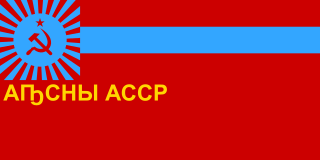
Abkhaz, also known as Abkhazian, is a Northwest Caucasian language most closely related to Abaza. It is spoken mostly by the Abkhaz people. It is one of the official languages of Abkhazia, where around 100,000 people speak it. Furthermore, it is spoken by thousands of members of the Abkhazian diaspora in Turkey, Georgia's autonomous republic of Adjara, Syria, Jordan and several Western countries. The Russian census of 2010 reported 6,786 speakers of Abkhazian in Russia.
Viacheslav Mikhail-ipa Tsugba was the third Prime Minister of the Republic of Abkhazia from December 1999 to May 2001. Before his appointment as Prime Minister, Tsugba had headed the Central Election Committee, which had overseen the internationally unrecognised simultaneously held October 1999 presidential election and constitutional referendum.
Politics in Abkhazia is dominated by its conflict with Georgia. Abkhazia became de facto independent from Georgia after the 1992–1993 war, but its de jure independence has only been recognised by a few other countries. Abkhazia is a presidential representative democratic republic with a multi-party system, wherein the President is both head of state and head of government. Executive power is exercised by the government of the Republic of Abkhazia. Legislative power is vested in both the government and the People's Assembly of Abkhazia.

The Abkhaz–Georgian conflict involves ethnic conflict between Georgians and the Abkhaz people in Abkhazia, a de facto independent, partially recognized republic. In a broader sense, one can view the Georgian–Abkhaz conflict as part of a geopolitical conflict in the Caucasus region, intensified at the end of the 20th century with the dissolution of the Soviet Union in 1991.

The ethnic cleansing of Georgians in Abkhazia, also known as the massacres of Georgians in Abkhazia and genocide of Georgians in Abkhazia — refers to the ethnic cleansing, massacres and forced mass expulsion of thousands of ethnic Georgians living in Abkhazia during the Georgian-Abkhaz conflict of 1992–1993 and 1998 at the hands of Abkhaz separatists and their allies. Armenians, Greeks, Russians and opposing Abkhazians were also killed. Roughly 200,000 to 250,000 Georgian civilians became Internally displaced persons (IDPs). The ethnic cleansing and massacres of Georgians has been officially recognized by the Organization for Security and Co-operation in Europe (OSCE) conventions in 1994, 1996 and again in 1997 during the Budapest, Lisbon and Istanbul summits and condemned the "perpetrators of war crimes committed during the conflict." On May 15, 2008, the United Nations General Assembly adopted a resolution A/RES/62/249 in which it "Emphasizes the importance of preserving the property rights of refugees and internally displaced persons from Abkhazia, Georgia, including victims of reported "ethnic cleansing", and calls upon all Member States to deter persons under their jurisdiction from obtaining property within the territory of Abkhazia, Georgia in violation of the rights of returnees". The UN Security Council passed a series of resolutions in which it appealed for a cease-fire.
The Sukhumi massacre took place on September 27, 1993, during and after the fall of Sukhumi into separatist hands in the course of the War in Abkhazia. It was perpetrated against Georgian civilians of Sukhumi, mainly by militia forces of Abkhaz separatists, their North Caucasian and Russian allies. It became part of a violent ethnic cleansing campaign carried out by the separatists.

The Government of the Autonomous Republic of Abkhazia is an administration recognized by Georgia as the legal and only government of Abkhazia. Abkhazia has been de facto independent of Georgia – though with very little international recognition – since the early 1990s. Vakhtang Kolbaia, elected in April 2013, is the current head of the government-in-exile.

This article refers to the history of Abkhazia from its pre-historic settlement by the lower-paleolithic hunter-gathers during the mesolithic and neolithic periods to the post-1992-1993 war situation.

The Abkhaz Autonomous Soviet Socialist Republic, abbreviated as Abkhaz ASSR, was an autonomous republic of the Soviet Union within the Georgian SSR. It came into existence in February 1931, when the Socialist Soviet Republic of Abkhazia, originally created in March 1921, was transformed to the status of Autonomous Soviet Socialist Republic within the Georgian SSR.

The Socialist Soviet Republic of Abkhazia was a short-lived republic within the Caucasus region of the Soviet Union that covered the territory of Abkhazia, and existed from 31 March 1921 to 19 February 1931. Formed in the aftermath of the Red Army invasion of Georgia in 1921, it was independent until 16 December 1921, when it agreed to a treaty uniting it with the Georgian Soviet Socialist Republic. The SSR Abkhazia was largely similar to an autonomous Soviet republic, though it retained de facto independence from Georgia, being given certain features only full union republics had, like its own military units. Through its status as a "treaty republic" with Georgia, Abkhazia joined the Transcaucasian Soviet Federative Socialist Republic, which united Armenian, Azerbaijani, and Georgian SSRs into one federal unit, when the latter was formed in 1922. The SSR Abkhazia was abolished in 1931 and replaced with the Abkhaz Autonomous Soviet Socialist Republic within the Georgian SSR.

The War in Abkhazia from 1992 to 1993 was fought between Georgian government forces for the most part, and Abkhaz separatist forces, Soviet Russian government armed forces and North Caucasian militants. Ethnic Georgians who lived in Abkhazia fought largely on the side of Georgian government forces. Ethnic Armenians and Russians within Abkhazia's population largely supported the Abkhazians, and many fought on their side. The separatists received support from thousands of North Caucasus and Cossack militants and from the Russian Federation forces stationed in and near Abkhazia.
The Sukhumi riot was a riot in Sukhumi, Abkhaz Autonomous Soviet Socialist Republic, Georgian Soviet Socialist Republic, Soviet Union, in July 1989, triggered by an increasing inter-ethnic tensions between the Abkhaz and Georgian communities and followed by several days of street fighting and civil unrest in Sukhumi and throughout Abkhazia.
This article is about the demographic features of the population of Abkhazia, including population density, ethnicity, education level, health, socioeconomic status, religious affiliations and other aspects of the population.
Parliamentary elections were held in Abkhazia on 23 November 1996, with a second round on 7 December. There was also a simultaneous referendum held amongst Abkhazian refugees.

The Armenians in Abkhazia form the second largest ethnic group in Abkhazia after the native Abkhazians. Armenians settled in Abkhazia in late 19th and the early 20th centuries and are now the largest ethnic group in Sukhumi, Gulripsh and Gagra districts forming 20% of the Abkhazian population with approximately 42,000 out of a total of 242,862.
Human rights in Abkhazia are granted by Chapter II of its Constitution which makes reference to adherence of Abkhazia to UDHR, ICCPR and ICESCR. However, Abkhazia is not a UN member state and is not a party of UN human rights treaties, unlike Georgia, whose sovereignty over Abkhazia is recognized by a bigger part of the international community.
This is an alphabetical list of Abkhazia-related articles.
Parliamentary elections were held in Abkhazia between October and December 1991.












